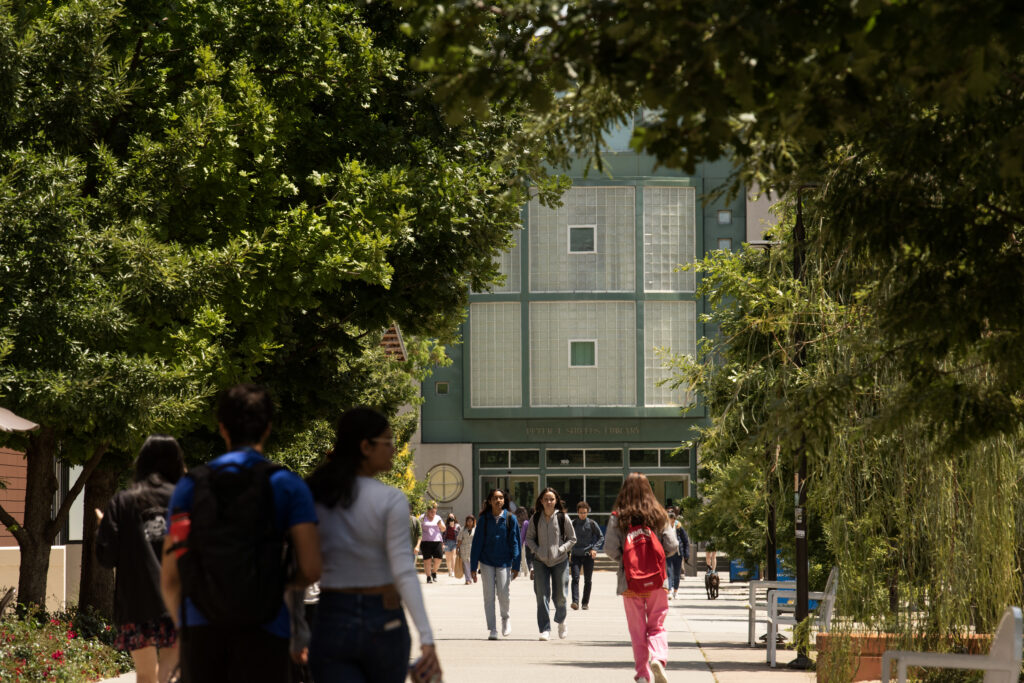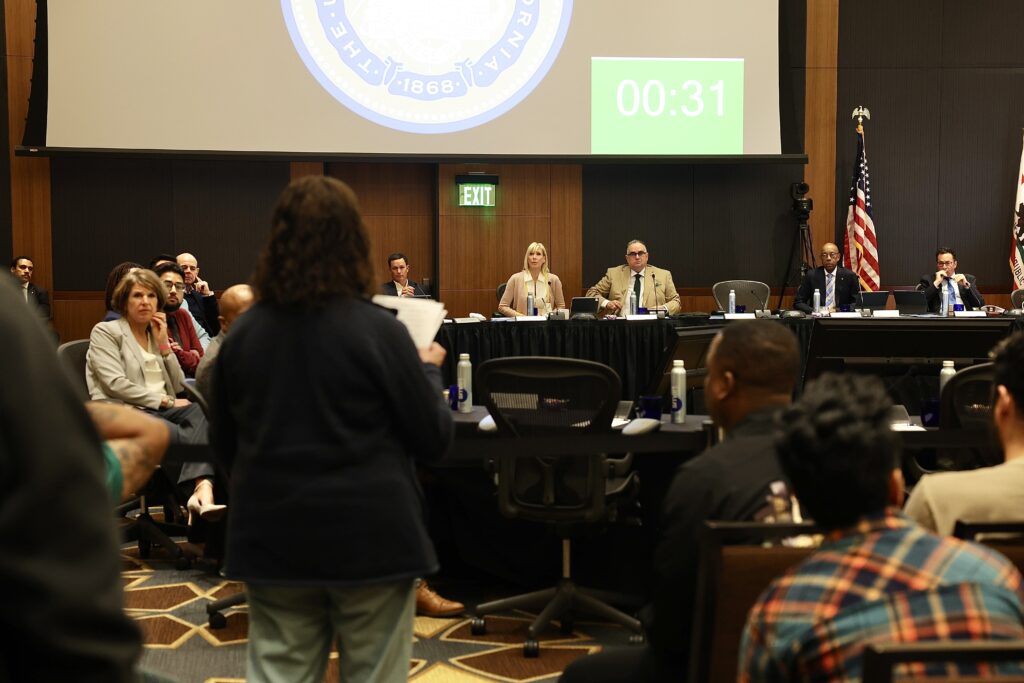
Student walk up and down the Promenade to Shields Library at UC Davis.
Credit: Gregory Urquiaga / UC Davis
Top Takeaways
- UC is likely to continue raising tuition for each incoming class and then freezing the cost for that cohort of students for up to six years.
- The rate of increase each year is based on inflation but has been capped at 5%. Regents appear opposed to increasing that cap.
- UC is worried about federal cuts and uncertain state finances. Students are concerned about affordability.
The University of California’s Board of Regents on Thursday indicated support for continuing to raise tuition for each incoming freshman class for at least several more years, though many regents appeared skeptical of hiking the maximum increase allowed each year.
Since the 2022-23 academic year, tuition has gone up for each incoming class of undergraduates, ranging from 3.5% to 5%. But the price was also then frozen for the duration of their enrollment, so long as they graduate within six years. The rate of increase each year is based largely on inflation, but is capped at 5%.
California residents who entered this past fall pay $14,436 in tuition and systemwide fees, not including some additional campus fees, living expenses and books, and will continue to pay that rate each year. For in-state freshmen starting this fall, their rate will be $14,934, about 3.4% higher. Out-of-state and international students pay significantly higher rates.
When the regents approved the so-called tuition stability plan in July 2021, they agreed to reconsider it prior to the 2027-28 academic year. Most regents said they want to renew the cohort policy, describing it as a resounding success that has improved campus budgets and brought predictability to students and their families. In the past, tuition increases affected all students from all cohorts, whether freshmen or seniors, at the same time and the same rates, often raising costs in the middle of their education.
The regents did not take action Thursday to formally extend the plan and only discussed the policy. A vote on it may be scheduled as soon as November, officials said.
A number of regents, however, appeared unlikely to support proposals from UC administrators to allow for even greater tuition increases, including one to increase the maximum tuition hike in a given year from 5% to 7%.
“I think it’s remarkable the success we’ve had, and that’s why I want to continue it,” said Richard Leib, a regent and a past chair of the board. “But I also have the feeling that if it’s not broken, why are we trying to fix it?”
UC staff said upping the maximum increases could help the system navigate budget problems, including federal cuts to research funding and state funding uncertainties.
The president of the UC Student Association, meanwhile, encouraged the regents to get rid of the policy altogether and keep tuition flat after the 2026-27 academic year.
“In order to ensure that the university can be a space that is accessible to students financially, I strongly urge you all to not renew the cohort tuition model,” Aditi Hariharan, a fourth-year student at UC Davis, said during remarks to the board. She added that keeping the policy would threaten UC’s ability to enroll “a diverse range of students from all economic backgrounds.”
In defending the plan, UC officials said Thursday that the policy has actually made attending UC less expensive for the system’s low-income students.
Shawn Brick, the system’s associate vice provost for student financial support, noted that the state’s Cal Grant program fully covers tuition and fees for qualifying students. Additionally, UC sets aside 45% of revenue generated from the tuition policy for financial aid. That, Brick said, has provided the system’s neediest students with additional aid for other expenses, such as textbooks, that was not previously available.
Nathan Brostrom, the system’s chief financial officer, said the policy has also generated $375 million in new revenue for campus operations, which has been used to support faculty-to-student ratios and improve student services.
At the same time, officials said the policy has not been a cure-all and that higher tuition revenue and state budget support have not kept pace with rising costs.
The UC staff on Thursday suggested three potential scenarios that would generate even more revenue from the tuition policy. One would be the proposal to increase the maximum annual increase to 7%. Another would be to add another increase, possibly 1%, on top of the inflation-based increase. The third option would be to reduce the amount of revenue that is set aside for financial aid, from 45% to 35%.
Most regents who spoke said they disapproved of the proposal to allow for annual increases as high as 7%. Maria Anguiano, the board’s vice chair, said she remains supportive of renewing the original policy, but added that tuition hikes of 7% “no longer feels modest.”
State Lt. Gov. Eleni Kounalakis, an ex-officio voting member of the board, said increasing the cap to 7% would be a “very significant change” and suggested tabling the idea altogether.
“If we have an extraordinary circumstance where you all feel the need to increase tuition more than 5% in any given year, you should have to come back to this body and explain why,” she said.
Jay Sures was one of the only regents who appeared to support the proposal. He said federal changes and threats have created “true headwinds for this university system” and that there are “issues with what potential state funding could be going forward that could potentially pose a true existential threat” to the system.
“What would happen if we did have a cap and our shortfall was such that we were in that sort of disaster situation? What are we going to be able to do if we put a cap on it today and we fall into that situation tomorrow?” Sures said.
Before the UC staff brings an official proposal to the board, they plan to consult with incoming President James Milliken, who takes over on Aug. 1, said Brostrom, the chief financial officer.
Janet Reilly, the board chair, said the current plan is to bring an action item to the board’s meeting in November, but added that could change.
“I think that what you are hearing from this group is a lot of gratitude and much satisfaction with the program that we rolled out,” Reilly said. “But still there are questions to be answered.”


